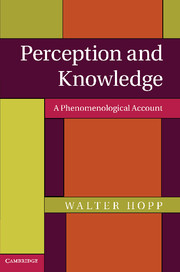Book contents
1 - Content
Published online by Cambridge University Press: 21 April 2011
Summary
Thorstein Veblen wrote, “Except where it is adopted as a necessary means of secret communication, the use of a special slang in any employment is probably to be accepted as evidence that the occupation in question is substantially make-believe” (Veblen 1994: 157). The term ‘content’ definitely qualifies as a piece of special slang in philosophical discourse, which can, it is true, sometimes veer into the make-believe. But contents, properly understood, are not make-believe; they are what beliefs, and many other spectacular things, are made of. The purpose of the present chapter is to provide a broad characterization of what mental content is, and a few arguments that at least some mental states have it. I will focus on the contents – if any – of perceptual states in subsequent chapters. I will, finally, argue that Husserl's early theory of intentional content provides the most satisfactory philosophical account of the relationships among intentional experiences or acts, their objects, and their contents.
Many mental states and acts, including perceptual ones, possess intentionality; they point beyond themselves towards something else, their objects. Intentionality, according to Husserl, is “the own peculiarity of mental processes ‘to be the consciousness of something’” (Ideas 1 §84: 200). The car that I perceive is one thing, and my act of perceiving it is quite another. The car is black, weighs a bit over a ton, and can hold five passengers. It is not an event, and it is not of or about anything.
- Type
- Chapter
- Information
- Perception and KnowledgeA Phenomenological Account, pp. 7 - 36Publisher: Cambridge University PressPrint publication year: 2011



